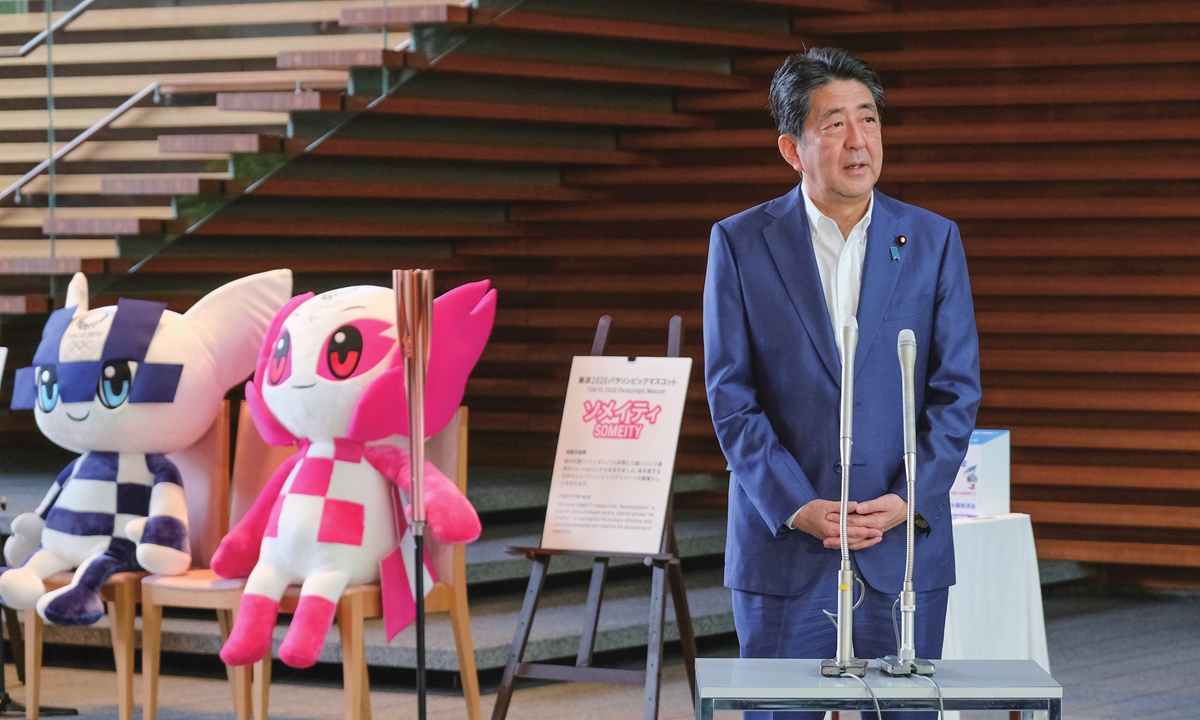Abe 'a pragmatic politician,' should keep fixing China-Japan ties: experts
By Yang Sheng and Sun Haoran Source: Global Times Published: 2020/8/24 23:38:40

Japanese Prime Minister Shinzo Abe speaks to the media on Monday upon his arrival at the Prime Minister's office, as Tokyo 2020 Olympic mascot Miraitowa (left), and Paralympic mascot Someity (2nd from left) look on. Abe returned to the hospital on Monday on the day he became the country's longest-serving head of government in 2,799 consecutive days in office. Photo: AFP
Japanese Prime Minister Shinzo Abe revisited the hospital on Monday on the day as he became the country's longest serving prime minister in terms of consecutive days in office. Analysts said Abe should remain pragmatic and continue to prevent China-Japan ties from sliding back to confrontation before his term ends. Otherwise, progress made in bilateral relations in the past seven years would be wasted.
Abe wants to take care of his health and do his utmost at his job, he said on Monday, after a second hospital visit within days sparked concern whether he could stay on as leader of the world's third biggest economy, Reuters reported.
Since 2012, the beginning of Abe's term, China-Japan ties experienced the worst period since the honeymoon era in the 1970s-1980s, after the Japanese government illegally "nationalized" China's Diaoyu Islands, followed by the two countries clashing on sovereignty and history.
Although the inter-government relations remained intense, people-to-people exchanges and economic and trade cooperation between the two biggest economies in Asia have recovered gradually, and the Chinese people's view of Japan and Abe have become more mature, confident and rational, Chinese experts said.
Among Chinese public, especially on social network platforms, Abe's image has improved. In 2012, he was considered a negative figure. But in recent years, especially after Japan's assistance to China to fight the pandemic early in 2020, Chinese people started to view Abe as a pragmatic person who is flexible while serving Japan's interests.
Abe's efforts to promote the Tokyo Olympic 2020 and please US President Donald Trump also make him a "hardworking politician who doesn't care about his own dignity" among Chinese netizens, especially when he was "humiliated by Trump on some diplomatic occasions." Some Chinese even sympathized with his awkward attempts to deal with the US, and also praised his efforts to fix ties with China, a Beijing-based expert on Japan affairs said, who asked not to be named.
"Abe is a pragmatic politician and leader who has repaired China-Japan ties in recent years. If there was no coronavirus pandemic, China and Japan would have had a significant diplomatic event this year. But, unfortunately, it didn't happen, and bilateral ties face new challenges," said Da Zhigang, director and research fellow of the Institute of Northeast Asian Studies at the Heilongjiang Provincial Academy of Social Sciences and chief expert at the Northeast Asian Strategic Studies Institute.
Abe has served 2,799 consecutive days as Prime Minister - surpassing the previous record set by his great-uncle, Eisaku Sato, who stepped down in 1972.
"Abe has been able to maintain the position because opposition parties are too weak and have never been able to compete with the Liberal Democratic Party [LDP]," Yoshikazu Kato, a Japanese adjunct associate professor at the Asia Global Institute of the University of Hong Kong, told the Global Times on Monday.
"Japanese people were very dissatisfied with their political achievements, especially the frequent changes in prime ministers before Abe," Kato said. The turnover of Japanese leaders was common from 2006 to 2012, during which time six prime ministers served, with each of them only serving for about a year.
The consistency of Japan's head of government is also easier for China to deal with Japan, as actions made by Tokyo would be predictable, and communication channels would be more certain and stable. And if Japan faces a major change to its politics again, China-Japan ties would face new challenges, as conservative US and Japanese forces are trying to damage the relations again, Da said.
Abe gave brief comments to reporters after leaving the hospital on Monday, NHK reported. Abe did not say what was ailing him, but expressed support to "those who have supported me even during very difficult times," Japanese media reported.
"Abe has been making active and prudent efforts to deal with relations with China, trying to make contact with Chinese leaders as much as possible through bilateral and multilateral channels," Kato said.
However, Kato pointed out that Abe is also facing pressure from opposition parties, who made the public force him to show a tougher stance toward China, particularly on issues such as the East China Sea and Hong Kong, and the Japanese public can also influence his decision, Kato noted.
Da said that before the end of his term, Abe should at least make sure that China-Japan ties would at least not slide back to confrontation - although this is hard as he faces pressure from both the US and Japanese public, which are deeply influenced by the conservative right-wing mentality, such as suggesting Japan should join the Five Eyes Alliance to contain China for the US.
"Keeping people-to-people and economic exchanges can at least benefit the economic recovery for the region in the post-pandemic era," he noted.
RELATED ARTICLES:
Posted in: DIPLOMACY